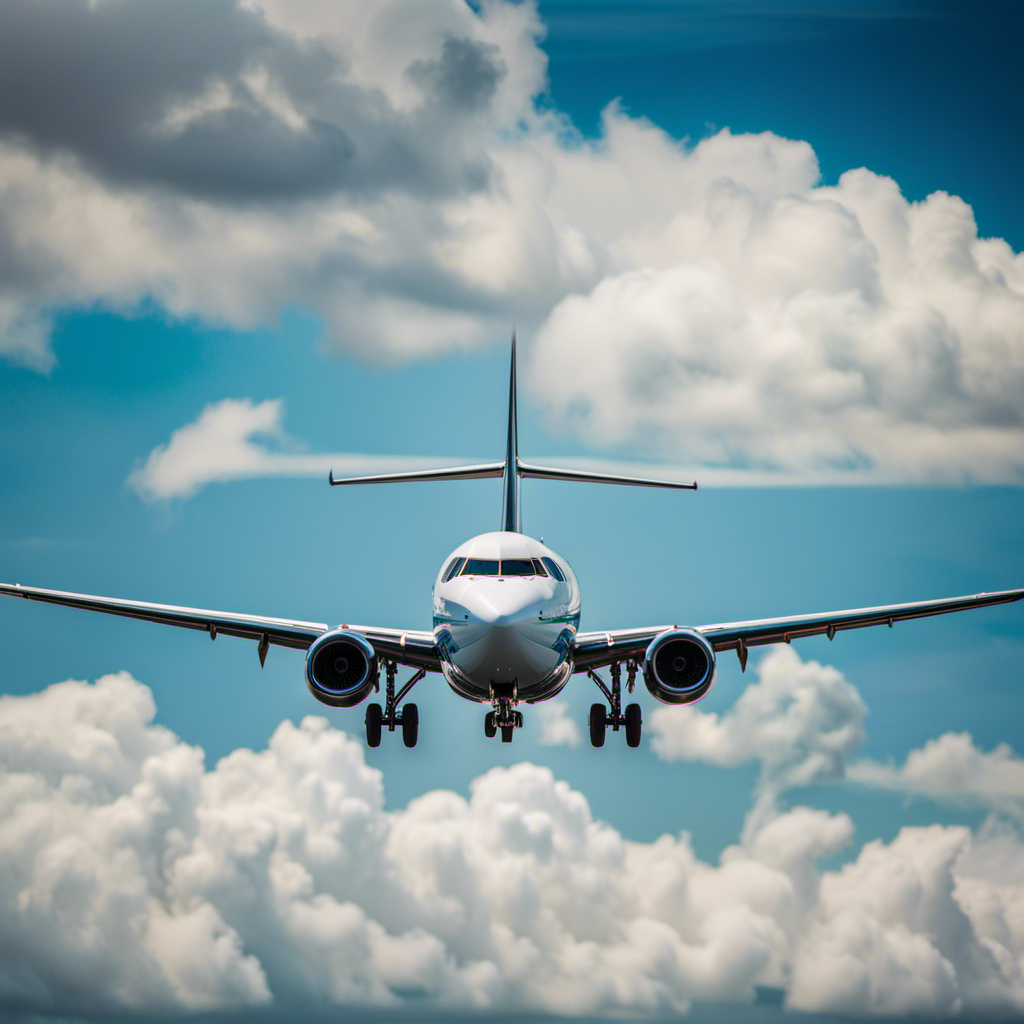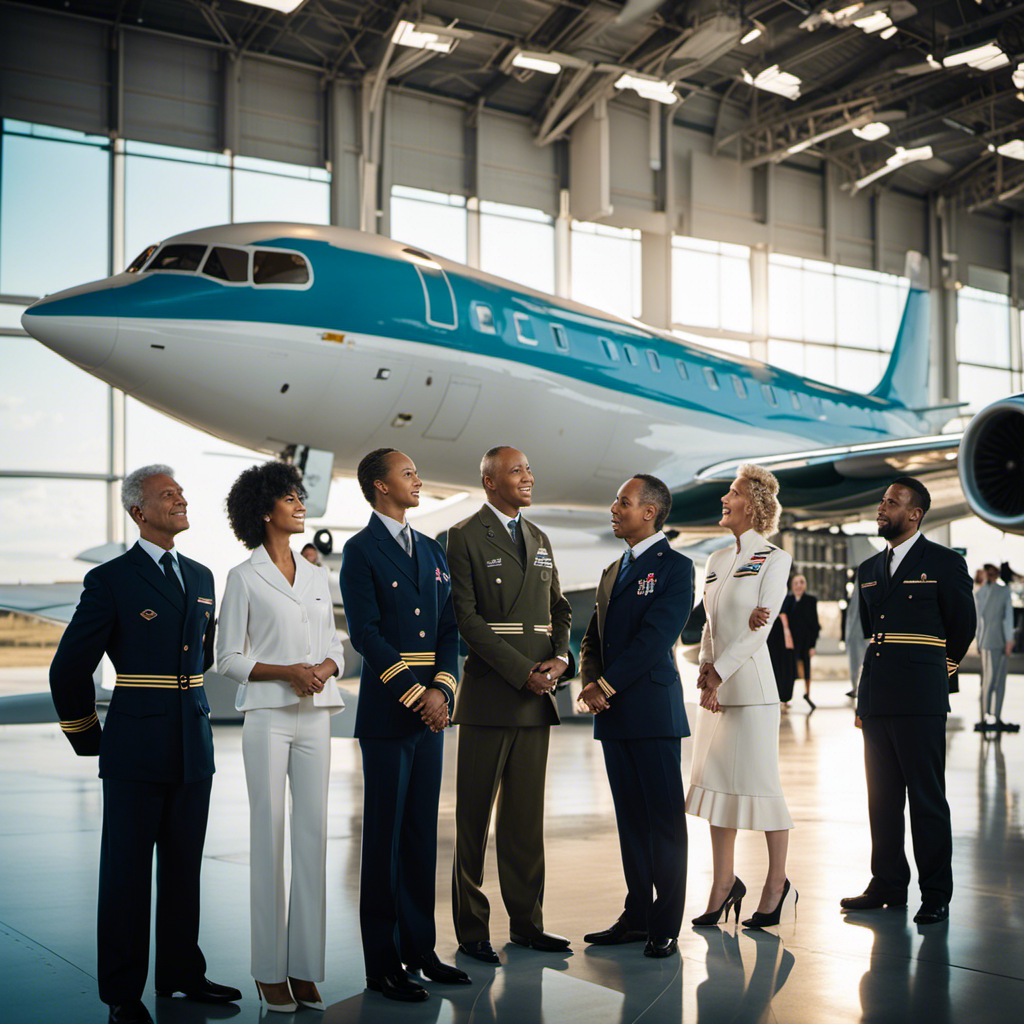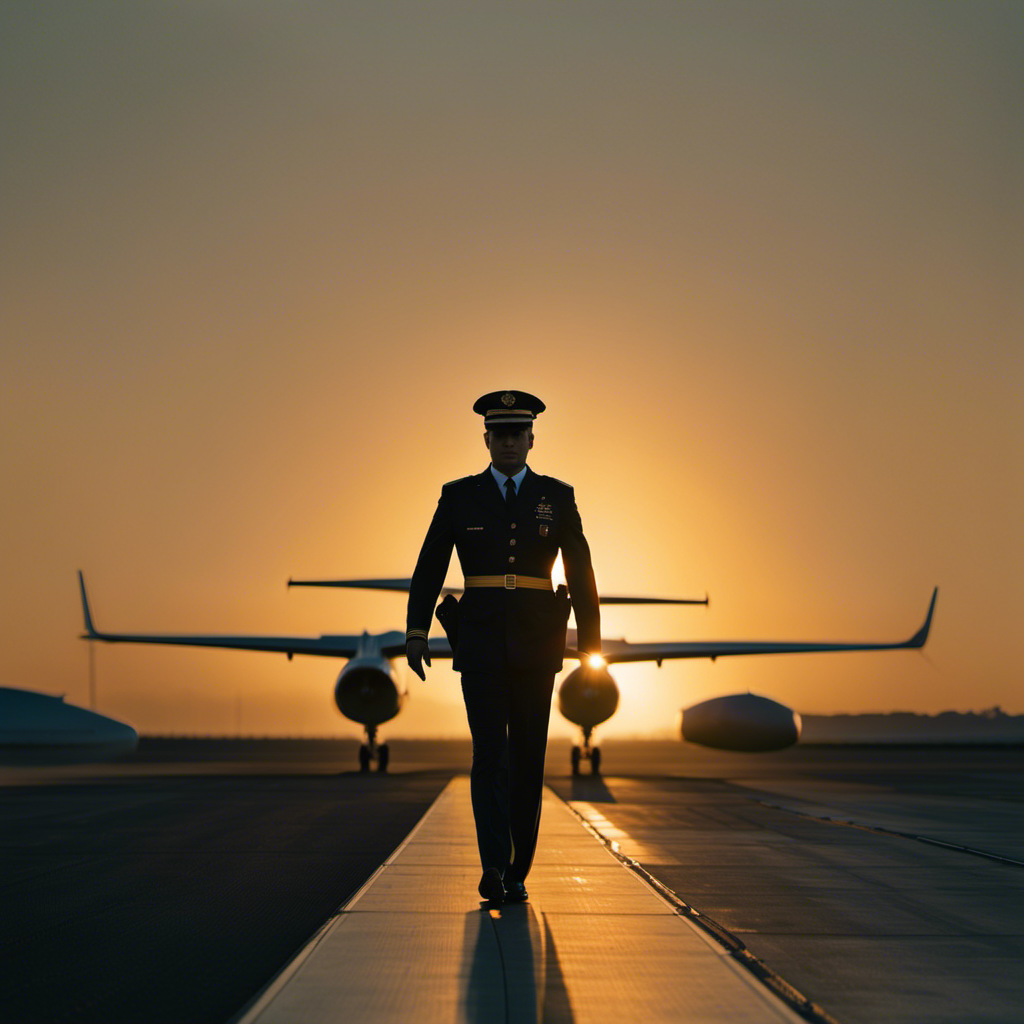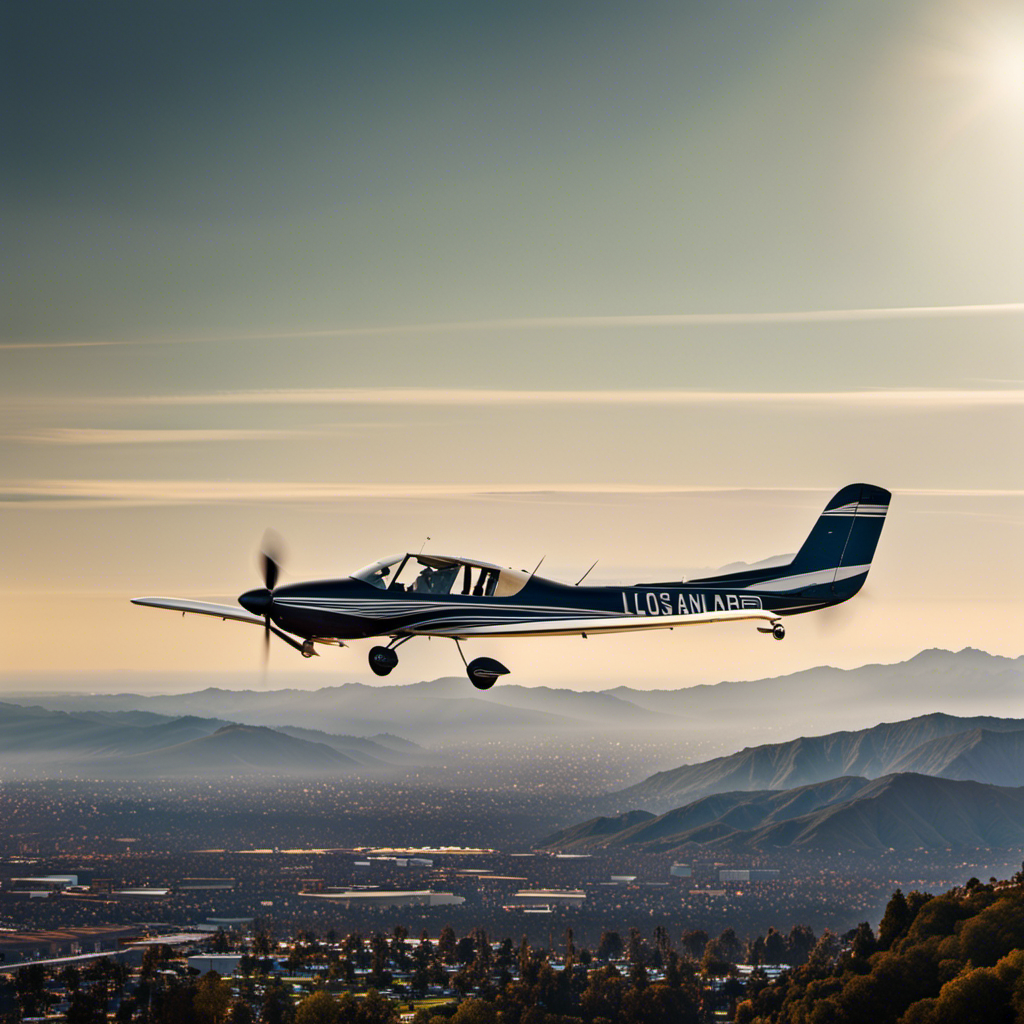As an experienced pilot, I can attest to the exhilaration and sense of liberation that comes from flying. Now is the perfect time to begin your pilot training adventure.
The demand for pilots is growing rapidly, making it an opportune moment to embark on this exciting career path. In this article, I will guide you through the considerations and steps to take as you begin your pilot training.
So fasten your seatbelts and get ready to soar to new heights!
Key Takeaways
- Aviation medical exams are essential for assessing overall health and fitness for flying, including vision, hearing, cardiovascular fitness, and mental acuity.
- Researching flight schools is crucial, considering factors such as accreditation, reputable organizations, instructor qualifications, and the use of evaluation tables.
- A well-structured flight training curriculum is important, balancing theoretical knowledge and practical hands-on training, with qualified flight instructors playing a significant role.
- Networking and building connections in the aviation industry are vital for success, including attending conferences, joining professional organizations, and engaging with fellow pilots and industry experts.
The Growing Demand for Pilots
There’s a growing demand for pilots in the aviation industry. As an experienced pilot myself, I can confidently say that now is the perfect time to pursue a career in aviation.
The job opportunities for pilots are on the rise, thanks to the pilot shortage that the industry is currently facing. Airlines and private companies are actively looking for skilled pilots to fill their cockpits. With the increasing number of retiring pilots and the expansion of the airline industry, the demand for pilots is only going to increase in the coming years. This presents an excellent opportunity for aspiring pilots to enter the field and secure a rewarding career.
However, before taking the next step into pilot training, it’s important to understand the age and eligibility requirements.
Age and Eligibility Requirements
When it comes to pursuing a career as a pilot, there are certain age and eligibility requirements that must be met.
The minimum age requirement for pilot training can vary depending on the type of license or certificate being sought, but generally ranges from 16 to 18 years old.
In addition to age, educational qualifications and prerequisites, such as a high school diploma or equivalent, are often necessary to begin pilot training.
Minimum age requirement for pilot training
The minimum age to start pilot training is typically 16 years old. Age restrictions are an important factor in pursuing a career as a pilot. This requirement ensures that aspiring pilots possess the maturity and responsibility necessary for the job.
However, it’s essential to note that the exact age requirement may vary depending on the country or aviation authority. While 16 is the minimum age, most individuals choose to start their training in their late teens or early twenties.
As for the training duration, it typically takes around 18 to 24 months to complete the necessary flight hours and pass the required examinations. This timeframe allows aspiring pilots to gain the necessary knowledge and skills to safely operate an aircraft.
Moving on to educational qualifications and prerequisites, a strong foundation in mathematics, physics, and English is crucial, along with a high school diploma or equivalent.
Educational qualifications and prerequisites
To prepare for a career as a pilot, you’ll need a strong foundation in subjects like mathematics, physics, and English. These educational qualifications are essential to succeed in pilot training and to understand the principles and calculations involved in flying an aircraft.
In addition to these subjects, many flight schools and training programs have specific prerequisites that must be met before enrolling. These prerequisites may include a minimum age requirement, a high school diploma or equivalent, and a medical certificate. It is important to research and understand the specific educational qualifications and prerequisites for the pilot training program you are interested in.
Financial Considerations
When it comes to pursuing a career in aviation, one of the key considerations is the cost of pilot training programs. As someone who has personally gone through the process, I understand the financial implications involved.
In this discussion, I will delve into the cost of pilot training programs, explore financing options, and shed light on scholarships that can help alleviate the financial burden.
Cost of pilot training programs
You should consider the cost of pilot training programs before making a decision. As someone who has been through the process, I can tell you that it’s important to understand the financial implications and time commitment involved.
Pilot training programs can vary significantly in cost, ranging from a few thousand dollars to tens of thousands. It’s crucial to research and compare different programs to find one that fits your budget.
Additionally, consider the time commitment required for training. Depending on the program, it can take anywhere from several months to a year or more to complete. This is something you need to be prepared for, as it can have an impact on your work or personal life.
Understanding the cost and time commitment will help you make an informed decision about pursuing pilot training.
Now, let’s explore the financing options and scholarships available to aspiring pilots.
Financing options and scholarships
Consider exploring the various financing options and scholarship opportunities available for aspiring pilots. When it comes to pursuing a career in aviation, financing your pilot training can be a significant concern. However, there are numerous options available to help make your dreams a reality.
Many flight schools offer financing programs that allow you to pay for your training in installments or through loans. Additionally, there are various scholarships specifically designed for aspiring pilots, which can provide financial assistance and alleviate the burden of training costs. It is important to thoroughly research and apply for these financing options and scholarships, as they can significantly reduce the financial burden of pilot training.
By taking advantage of these opportunities, you can focus on your training and pave the way for a successful career in aviation.
Now, let’s discuss the time commitment involved in pilot training.
Time Commitment
There’s no better time than now to think about the time commitment required for pilot training. As someone who has gone through the process, I understand the importance of effective time management and balancing commitments.
Pilot training demands a significant amount of dedication and focus. It involves hours of classroom instruction, simulator sessions, and flight hours. Balancing these requirements with other commitments can be challenging, but it is not impossible.
Prioritizing tasks, creating a schedule, and staying organized are key elements in managing your time effectively. By carefully planning and allocating your time, you can ensure that you make progress in your training while still fulfilling your other responsibilities.
However, beyond time management, personal motivation and passion also play a crucial role in successfully completing pilot training.
Personal Motivation and Passion
When thinking about personal motivation and passion, it’s important to remember why you are pursuing a career as a pilot. For me, the desire to fly and explore the skies has always been deeply ingrained in my being.
The thrill of taking off, the sense of freedom, and the ability to navigate through the clouds are experiences like no other. But beyond the exhilaration, becoming a pilot offers tremendous personal development and career opportunities.
It allows you to constantly learn and grow, both professionally and personally. From honing your technical skills to developing leadership qualities, being a pilot opens doors to a wide range of possibilities.
So, when considering whether to embark on this journey, tap into your inner drive and remember the endless potential that awaits.
Now, let’s transition into discussing the important health and fitness requirements for aspiring pilots.
Health and Fitness Requirements
As a pilot, maintaining physical and mental well-being is crucial for ensuring safety in the skies.
One key aspect of this is undergoing regular medical examinations to assess our fitness to fly. These examinations evaluate our overall health, including factors such as vision, hearing, cardiovascular fitness, and mental acuity, to ensure that we are in optimal condition to operate an aircraft.
Medical examinations for pilots
If you want to become a pilot, you’ll need to undergo regular medical examinations to obtain and maintain your medical certificate. These exams, known as aviation medical exams, are a crucial part of ensuring the safety and well-being of pilots.
As someone who has gone through these exams numerous times, I can attest to their importance. The aviation medical exam evaluates various aspects of your physical and mental health, including vision, hearing, cardiovascular health, and psychological well-being. It is essential to approach these exams with a knowledgeable and experienced mindset, as they require precision and attention to detail.
Maintaining physical and mental well-being
After ensuring that you meet the necessary medical requirements to become a pilot, it is crucial to maintain your physical and mental well-being throughout your training.
As a pilot, physical exercise plays a vital role in keeping you fit and alert. Engaging in regular exercise routines, such as cardiovascular workouts and strength training, can enhance your stamina and improve your overall health. Moreover, physical activity releases endorphins, which can help manage stress and promote a positive mindset.
Stress management is essential for pilots, as the job can be demanding and high-pressure. Incorporating stress-relief techniques like meditation, deep breathing exercises, and time management strategies into your daily routine can help you stay calm and focused.
By prioritizing your physical and mental health, you will be better equipped to navigate the challenges of pilot training.
Transitioning into researching flight schools, it is important to consider various factors that will contribute to your success in becoming a pilot.
Researching Flight Schools
Now is the perfect time to start researching flight schools to find the best fit for your pilot training. When it comes to flight schools, two important factors to consider are accreditation and instructor qualifications. Accreditation ensures that a flight school meets the highest standards of safety and education, giving you confidence in the quality of training you will receive. Look for schools that are accredited by reputable organizations such as the Federal Aviation Administration (FAA) or the European Aviation Safety Agency (EASA). Equally important are the qualifications of the flight instructors. They should have extensive experience in aviation, hold the necessary certifications, and possess excellent teaching skills. To help you evaluate different flight schools, here is a table outlining some key aspects to consider:
| Flight School | Accreditation | Instructor Qualifications |
|---|---|---|
| Example Flight School 1 | FAA Accredited | Experienced and certified |
| Example Flight School 2 | EASA Accredited | Highly skilled instructors |
| Example Flight School 3 | FAA and EASA Accredited | Experienced and qualified |
Flight Training Curriculum
Once you’ve chosen a flight school, it’s essential to familiarize yourself with their flight training curriculum. As a knowledgeable and experienced pilot, I understand the importance of a well-structured training program.
The flight training techniques employed by the school can greatly impact your learning experience and ultimately your success as a pilot. Look for a curriculum that incorporates a balance of theoretical knowledge and practical hands-on training.
Additionally, consider the qualifications of the flight instructors who will be guiding you throughout your training. They should possess extensive experience, relevant certifications, and a passion for teaching. By thoroughly understanding the flight training curriculum and the qualifications of the instructors, you can ensure that you are receiving top-notch instruction.
As you progress in your training, networking and building connections within the aviation industry will play a crucial role.
Networking and Building Connections
Make sure to take advantage of every opportunity to network and connect with professionals in the aviation industry. Building a strong network and establishing industry connections are crucial for success in the field of aviation.
As a pilot, I have learned the importance of networking opportunities firsthand. Attending aviation conferences, joining professional organizations, and participating in industry events have opened doors to valuable connections and opportunities. Engaging with fellow pilots, instructors, and industry experts has allowed me to gain insights, exchange knowledge, and even find potential job prospects.
These connections have provided me with mentorship, guidance, and a sense of community within the aviation industry. By actively seeking out and nurturing these relationships, you can create a network that will support and propel your career forward.
Now, let’s explore taking the first step towards your pilot training journey.
Taking the First Step
When it comes to pursuing a career as a pilot, enrolling in a pilot training program is the crucial first step. I have personally experienced the importance of this decision, as it provided me with the necessary foundation and skills to excel in the aviation industry.
Once enrolled, setting clear goals and creating a roadmap for your pilot career becomes essential, as it allows you to stay focused, motivated, and on track towards achieving your dreams.
Enrolling in a pilot training program
Enrolling in a pilot training program is a great way to start your journey towards becoming a pilot. The enrollment process is simple and straightforward, allowing you to get started quickly. Once you’ve enrolled, you can expect the training duration to vary depending on the type of program you choose.
Here are a few key points to consider:
- Find a reputable flight school that offers comprehensive pilot training.
- Review the enrollment requirements and ensure you meet them.
- Explore the different training programs available and choose the one that suits your goals and schedule.
- Plan your finances and explore any financing options that may be available to you.
Setting goals and creating a roadmap for your pilot career
Once you’ve created goals and a roadmap for your pilot career, it’s essential to regularly review and adjust them as needed. Setting goals and creating a roadmap is crucial in any profession, but especially in the aviation industry where precision and planning are paramount. As a pilot, I understand the importance of having clear objectives and a well-defined path to achieve them. To help you visualize the process, I have created a table below outlining some key elements of setting goals and creating a roadmap for your pilot career.
| Goals | Action Steps | Timeline |
|---|---|---|
| Obtain Private Pilot License | Enroll in flight training program | 6 months |
| Build Flight Experience | Fly at least 100 hours | 1 year |
| Earn Commercial Pilot License | Complete required flight hours and pass exams | 2 years |
| Pursue Airline Career | Apply to regional airlines | Ongoing |
Frequently Asked Questions
Are there any specific physical requirements or limitations that could prevent someone from becoming a pilot?
Yes, there are physical requirements and medical restrictions that could prevent someone from becoming a pilot. These include things like vision, hearing, and cardiovascular health. It’s important to meet these standards before pursuing pilot training.
How long does it typically take to complete pilot training and obtain a private pilot license?
It typically takes several months to complete pilot training and obtain a private pilot license. The requirements include passing written and practical exams, accumulating flight hours, and meeting medical and age requirements.
What are the different types of flight schools and training programs available?
Flight schools come in various forms, from traditional brick-and-mortar institutions to cutting-edge online programs. Online pilot training offers flexibility, convenience, and the ability to learn at your own pace, making it a popular choice for many aspiring pilots.
Are there any financial aid options or scholarships available for aspiring pilots?
Yes, there are financial aid options and scholarships available for aspiring pilots. Many flight schools, organizations, and foundations offer assistance to help alleviate the financial burden of pilot training.
How important is networking and building connections within the aviation industry for future job opportunities?
Networking and building connections in the aviation industry are crucial for future job opportunities. It allows you to meet professionals, gain insights, and create potential employment prospects. The benefits of networking cannot be overstated when it comes to securing a job in aviation.
Conclusion
In conclusion, there is no better time than now to embark on your pilot training journey. The demand for pilots is steadily increasing, presenting ample opportunities for those with the necessary skills and qualifications.
With careful consideration of age, financial aspects, and time commitment, anyone with a passion for aviation can pursue their dreams. Take, for example, John, a 45-year-old accountant who always dreamt of flying. He finally decided to pursue his pilot training and is now happily flying passengers across the world, living his dream.
So don’t wait any longer, take that first step towards your pilot training today.









